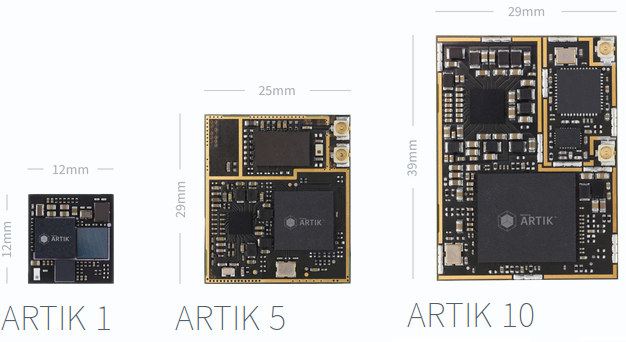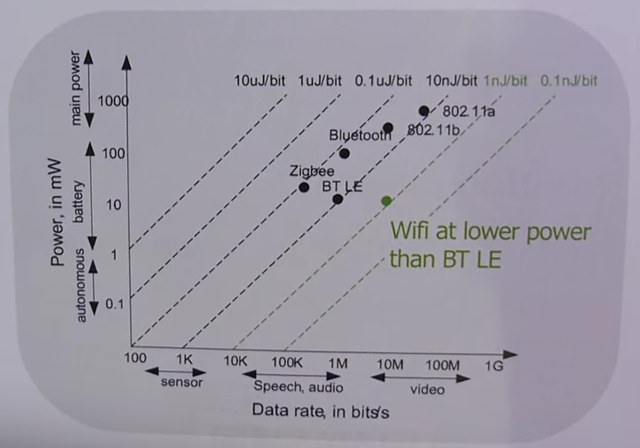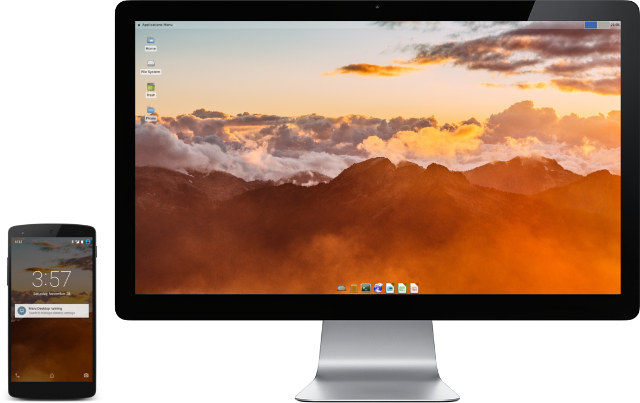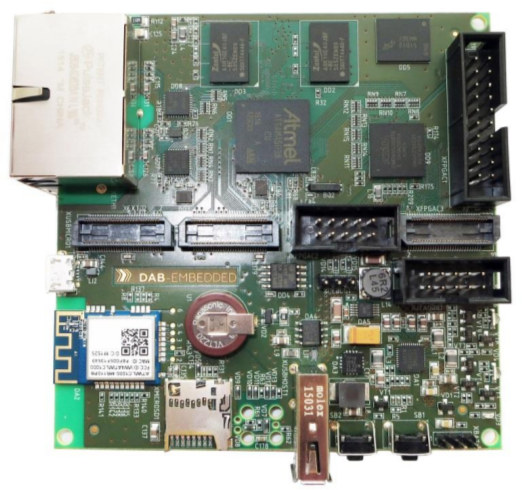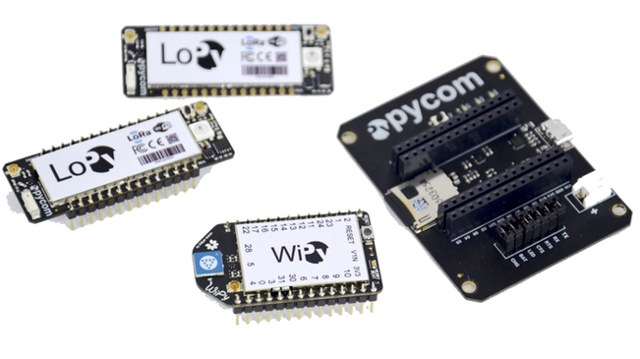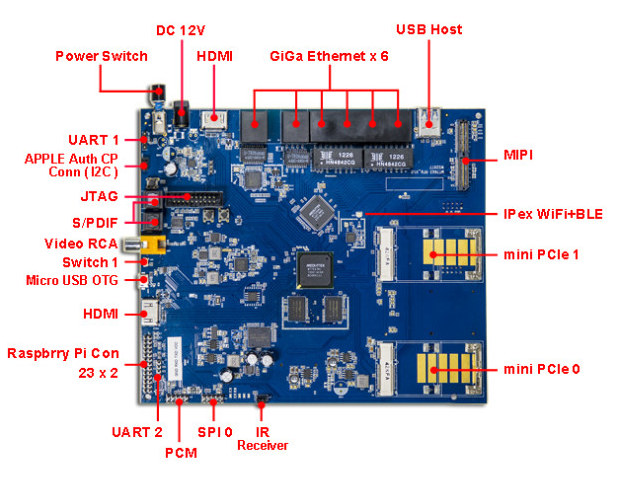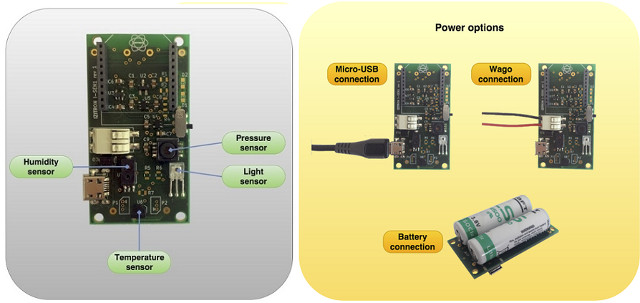Samsung Artik IoT boards will finally start selling on February 22 via Digikey. With the many fascinating developments in the IoT space over the year, you’d be forgiven if you completely forgot about Samsung Artik boards. So let’s have a quick recap. The Korean company previously announced three boards all supporting Bluetooth LE: Artik 1 – Ineda Systems Dual Core microAptiv MIPS32 processor with 1MB on-chip RAM, no GPU, and 4MB SPI flash Artik 5 – Dual core Exynos ARM processor @ 1GHz with ARM Mali 400 MP2 GPU, 512MB RAM and 4GB eMMC flash (both on-chip), with WiFi & Zigbee/Thread connectivity Artik 10 – Octa core Exynos processor with 4x ARM Cortex A15 @ 1.3GHz, 4x ARM Cortex A7 @ 1.0 GHz with ARM Mali-T628 GPU, 2GB LPDDR3 (on-chip), 16GB eMMC flash, and WiFi & Zigbee/Thread connectivity Samsung also partnered with multiple companies working on: Operating Systems – Tizen, […]
Rockchip RKi6000 Low Power WiFi SoC Showcased with IoT Demo Board
Announced last year, Rockchip RKi6000 SoC promised WiFi connectivity at Bluetooth 4.0 LE power consumption levels, and the company has recently showcased the technology with a demo board controlling four lightbulbs. The chart above shows Rorkchip solution can transmit data at 802.11b speeds (11 Mbps) while still keeping power consumption low at around 10mW, similar to BT LE, and good enough to run on batteries. Peak Tx and Rx power has gone up a little since the first announcement, as the company now claims 66mW @ 11 Mbps instead of just 60mW. While there’s basically zero information about the chip on Rockchip website, you may have noticed a QR code on the product brochure in Charbax video linking to Rockchip IoT Club, which you can join as long as you work for a company with a specific project in mind. Jean-Luc Aufranc (CNXSoft)Jean-Luc started CNX Software in 2010 as a […]
Open Source Operating Systems News – Maru OS, Zephyr, ReactOS, Tizen 3.0, and Raspbian
There have been several news related to open source operating systems in the last couple of weeks including Maru OS to run Debian on Android, Zephyr Project real-time OS managed by the Linux Foundation, ReactOS an open source port of Windows XP, and Raspberry Pi boards are getting a Tizen 3.0 port, as well as a new Raspbian release. Maru OS – Mobile <-> Desktop Convergence Maru OS mobile operating system is supposed to do what Ubuntu convergence promised: it runs in mobile mode on the go with Android Lollipop mobile OS, once you connect the phone to an HDMI screen, and pair Bluetooth keyboard and/or mouse, it will switch to desktop mode running Debian Linux. The downside is that so far it a single developer (Preetam D’Souza) worked on it, and the beta version only works on Nexus 5 smartphone. However, since the project went viral, dozen of other […]
DAB Embedded OpenWrt Router Board Combines Atmel SAMA5D3 SoC and Altera MAX 10 FPGA
DAB Embedded, a Belgian engineering company specialized in research and development of electronic products, has designed DAB-OWT-SAM5 router board powered by Atmel SAMA5D36 Cortex-A5 processor and Altera MAX 10 FPGA, which runs OpenWrt or Windows Embedded Compact 7, and targets IoT applications. DAB-OWT-SAM5 board specifications: SoC – Atmel SAMA5D36 ARM Cortex-A5 processor @ 536MHz with Floating-Point Unit. FPGA – Altera MAX 10 FPGA with integrated ADC (Exact part number not disclosed) System Memory – Up to 512MB DDR2 Storage – Up to 2GB NAND flash, 1Mbit SPI flash, micro SD slot Connectivity – 2x Fast Ethernet ports, 802.11 b/g/n WiFi (Direct, station mode, and soft-AP) via Atmel ATWILC1000B module Display Interface – LVDS connected to FPGA USB – 1x USB 2.0 host, 1x USB 2.0 device Expansion Connectors Wired interfaces – RS232, CAN 2.0 A/B, KNX, RS-485/422, etc… Wireless connectivity – Zigbee, Z-Wave, KNX RF, etc… Power Supply – 5V DC […]
Linaro Connect 2016 Bangkok Schedule – March 7-11, 2016
Linaro Connect Bangkok (BKK16) will take place on March 7 – 11, 2016, and the schedule is now available for the 5-day event with keynotes and sessions. Whether you’re going to attend or not, it’s always interesting to check the schedule to find out what’s going on in terms of ARM Linux development. The five days will focus on work by different Linaro groups, but really sessions are mixed for any given day, and I’ve created a virtual schedule for each day with available information, as Linaro has become a little more closed to the outside than when it was launched a few years ago. Monday 7 – LITE (Linaro IoT & Embedded Group) 1400 – 14:50 – Evolution of the Reference Software Platform Project The Reference Software Platform lead project was introduced in Linaro Connect San Francisco 2015, and since then it evolved and matured with the completion of […]
LoPy Tiny IoT Developer Board Runs MicroPython, Supports LoRa, WiFi and Bluetooth (Crowdfunding)
Pycom launched WiPy last year, a WiFi IoT board based on Texas Instruments CC3200 ARM Cortex M4 SoC, and a few months after sending rewards to their Kickstarter backers, they are back on the crowdfunding platform to launch LoPy, another IoT development board that runs MicroPython and offers LoRa, WiFi and Bluetooth LE connectivity. LoPy board hardware specifications: SoC – Dual processor @ 160 MHz with WiFi & BLE radio with 400 kB RAM, 1MB flash External Storage – 4MB flash Connectivity 802. 11b/g/n @ 16Mbps with WEP, WPA/WPA2 WiFi security; SSL/TLS support; AES encryption engine. Bluetooth Classic and Low Energy LoRaWAN Semtech LoRa transceiver SX1272 @ 868 MHz (Europe) or 915 MHz (North America). Range – Node: Up to 40km; Nano-Gateway: Up to 5 km Nano Gateway Capacity – Up to 100 nodes. Internal chip antenna and u.fl connectors for external antennas Headers – 2x 14-pin headers for: Up […]
$98 Geek Force Mediatek MT7623 Router Board Features 6 GbE Ports, 3 mPCIe Slots for WiFi, 3G, or LTE (Crowdfunding)
We’ve seen a few interesting and relatively powerful router board launched last year, with the likes of MQMaker WiTi or Turris Omnia, AsiaRF has now designed Geek Force board powered by Mediatek MT7623N/MT7623A quad core network processor combined with 2GB RAM, six Gigabit Ethernet ports, and optional 802.11ac and 3G connectivity via the three mPCIe slots available on the board. The board also features two HDMI ports, and supports multimedia capabilities such as H.264, MPEG-2, or VC-1 hardware video decoding. Geek Force board preliminary specifications: SoC – MediaTek MT7623A or MT7623N quad-core ARM Cotex-A7 @ 1.3GHz with Mali-450MP GPU (MT7623N only) System Memory – 2GB DDR3 Storage – 2GB eMMC or NAND Flash + SD card slot up to 128 GB, and maybe SATA via the mPCIe slots Connectivity – 6 Gigabit Ethernet ports (WAN / LAN behavior defined by firmware), 802.11 b/g/n WiFi & Bluetooth 4.0 via MT6625L with […]
Izitron I-SEN1 Environmental Sensors Board Works with XBee Modules
Izitron, a start-up based in the South of France, has designed a board with temperature, pressure, humidity and light sensors and a XBee header to provide a way to monitoring environmental variables for weather monitoring, agriculture, industrial applications, and more. I-SEN1 technical specifications: Sensors Temperature – Microchip MCP9700-E/T0; accuracy: ±4°C Accuracy from 0°C to +70°C | -4°C/+6°C Accuracy from -40°C to +150°C; temperature range: -40 to 125 °C Pressure – Infineon KP236N6165; accuracy: 2%; pressure range: 60 kPa to 165 kPa; temperature range: -40 to 125 °C Humidity – Honeywell HIH-5030-001; accuracy: ±3% RH; range: 0 to 100% RH; temperature range: -40 to 85 °C Light – AMS TSL14S-LF; reponsivity: 16 mV/ (uW/cm2); temperature range: 0 to 70 °C Header for XBee RF module Power Supply 5V via micro USB 5 to 12V via Wago terminal block 2x batteries No power management chip Power on/off button Power consumption – Up […]


